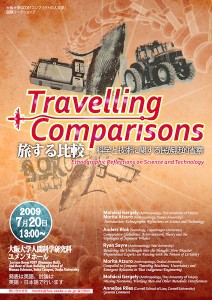TRAVELING COMPARISONS
Ethnographic Reflections on Science and Technology
International Workshop at Osaka University
 Date and Time: July 20th (Mon), 2009 13:00-18:00
Date and Time: July 20th (Mon), 2009 13:00-18:00
Venue: Lecture Room #207 (Humaine Hall), 2nd floor of East Building of School of Human Sciences (Suita Campus, Osaka University)
Open to public. Admission Free. No registration is required.
WORKSHOP ABSTRACT
This workshop will investigate some novel uses of the comparative method at the intersection of science studies and anthropology through ethnographic accounts of technoscience from/of Japan. Since its inception, much of the anthropological agenda has been revolving around various methods of comparison. While it has become something of a reflex to ask questions of similarity and difference, such comparative work has also provided an easy target for critics of simplification and reductionism. But, one may ask, aren’t these arguments themselves acts of comparison? Comparing may be more complex than it seems at a first glance. In the field, anthropologists work to recognize differences through continuously contrasting their findings with more commonsensical knowledge brought from home or elsewhere in order to make sense of the links between the particular and the general. On the other hand, however, such comparative work is also part and parcel of the very practices that are being studied. It is this implicit interplay between different scales of comparison that speakers of the workshop will reflect upon by examining complex ontologies of technoscientific praxis. In today’s globalizing world, knowledge is under constant negotiation and reordering around conflicting ideas of progress and development. Nowhere is it more evident than in the daily practices of living and working with old and new technologies. Scientist, mechanics, physicians and farmers whom anthropologists encounter in the field see development, uniqueness or backwardness in their innovations in the midst of complex relations, which connect local innovations and routines with the transnational circulation of people, objects and information. How do these circulations and unexpected connections stimulate us, innovators and users, to make comparisons in our daily engagements with technologies? How should we, anthropologists, reflect on the fact that while comparisons make connections, connections make comparisons, as well? By focusing on the relationship between ethnographies of Japanese science and the Japanese ethnography of foreign technologies, we will explore these recursive relations between comparisons and connections to challenge dominant modes of anthropological thinking.
GUEST SPEAKERS
Anders Blok (Sociology, Copenhagen University)
Ryan Sayre (Anthropology, Yale University)
Annelise Riles (Cornell School of Law, Cornell University)
PROGRAM
13:00 Welcoming Message by Kasuga Naoki
13:10 – 15:00 Session I
Introduction: Ethnographic Reflections on Science and Technology
Mohácsi Gergely (Anthropology, The University of Tokyo)
Morita Atsuro (Anthropology, Osaka University)
Comparative Globalities: Actor-network Theory and the Topologies of Japanese Whales
Anders Blok (Sociology, Copenhagen University)
Rendering the Unthought into the Thought: How Disaster Preparedness Experts are Futzing with the Notion of Certainty
Ryan Sayre (Anthropology, Yale University)
15:00 (Coffee Break)
15:15 – 16:45 Session II
Compelled to Compare: Traveling Machines, Uncertainty and Emergent Relations in Thai Indigenous Engineering
Morita Atsuro (Anthropology, Osaka University)
Missing Hormones, Working Men and Other Metabolic Interferences
Mohácsi Gergely (Anthropology, The University of Tokyo)
16:45 (Coffee Break)
17:00 Wrap-up and Discussion
General Comment by Annelise Riles (Cornell School of Law, Cornell University)
General Discussion
For further details contact:
Atsuro Morita (Osaka University) morita@hus.osaka-u.ac.jp, or
Gergely Mohacsi (The University of Tokyo) mohacska46@gmail.com
Symposium HP: http://gcoe.hus.osaka-u.ac.jp/090720workshop.html